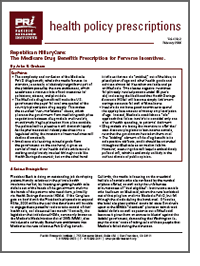Many politicos advocate more government as the “solution” du jour for American health care – as if we don’t have enough already. But government interference could come at the expense of new medical technology and competitive ventures that promise to improve quality, reduce costs, and increase choices for individuals. Americans generally object to an unwieldy government monopoly over medicine, so we should examine the achievements and failings of foreign systems.

Proposals for universal health care soothe American fears of health “crises” and poor international comparisons, including infant mortality and life expectancy. Such fears often reflect our cultural and societal diversity more than the actual quality of health care in the United States, which ranks very high in patient survival rates due to early detection of disease and post-diagnosis management. The U.S. ranks higher than most countries in the world for cancer survival rates in both men and women.
Canadian health care on the other hand, now faces the consequences of a rigid government monopoly. Rationing is so bad that the Supreme Court of Canada found that the government monopoly violated citizens’ civil rights. While Canadian politicians continue to deny the need for reducing government control, that’s not true for other countries. For example, look down under, at Australia.
